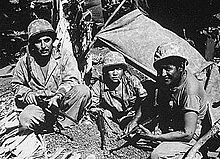Native Americans have taken an active role in every branch of the US military since the country formed. In fact, War Department officials have stated, that during WWII, if the entire population had enlisted at the same rate American Indians did, Selective Service would have been unnecessary. According to the Selective Service in 1942, at least 99 percent of all eligible Indians, healthy males aged 21 to 44, had registered for the draft. The annual enlistment for Native Americans jumped from 7,500 in the summer of 1942 to 22,000 at the beginning of 1945.
Native American contributions to war efforts during World World II were numerous but they are most famous of code talking. The name code talkers is strongly associated with bilingual Navajo speakers specially recruited during World War II by the Marines to serve in their standard communications units in the Pacific Theater. Code talking, however, was pioneered by Cherokee and Choctaw Indians during World War I.
 Check out some of these titles, available in Ames, to learn more about these efforts and contributions.
Check out some of these titles, available in Ames, to learn more about these efforts and contributions.
Navajo code talkers, produced by Triage, Inc. for the History Channel
Defending whose country?: Indigenous soldiers in the Pacific war, by Noah Riseman
This video, available through Alexander Street Press, reveals how strongly Navajo cultural identity and spiritual references correlated with traditional Marine Corps values and a passionate patriotism. The famous Navajo Code Talkers, memorialized by Hollywood in the feature film “Windtalkers,” were an integral part of the armed forces during World War II. Navajo veterans who fought in the Pacific in World War II, used their unwritten Native American tongue as an unbreakable code language, essential in the American military intelligence machine. Richard West, President, Museum of the American Indian, says, “Ironically, the U.S. military used the Native American language as a potent instrument of war although the government had prohibited [native] people from speaking their own language for almost a century.”Successive generations of young Navajo men who fought in the elite division of the U.S. Marine Corps, relate their stories in this film. Vincent and his brother enlisted in the 1970s; his brother died in Vietnam. Benjamin, Calbert and Michael are currently training as Marines in San Diego.

0 Comments.